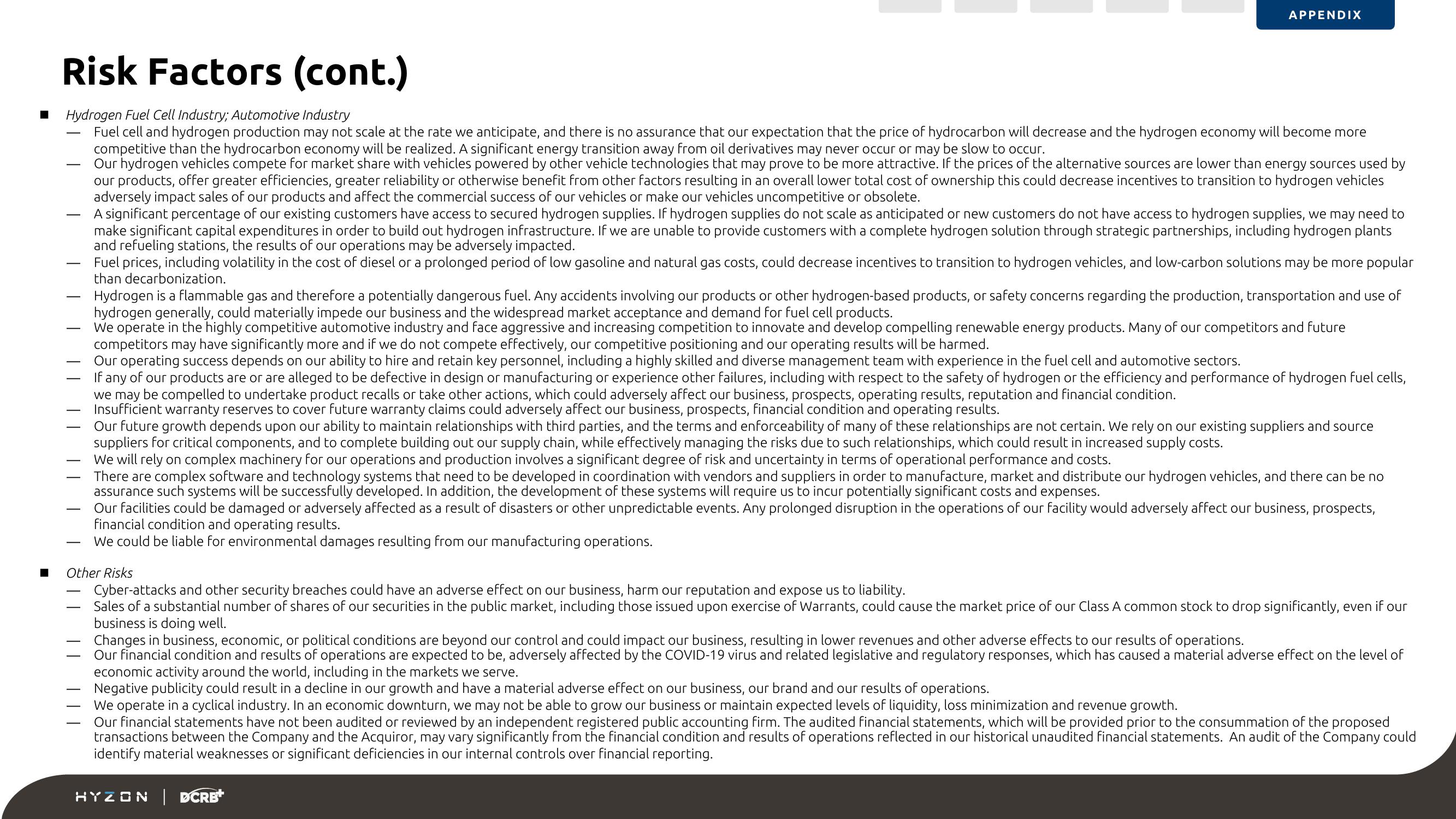Hyzon SPAC Presentation Deck
APPENDIX
Risk Factors (cont.)
Hydrogen Fuel Cell Industry; Automotive Industry
Fuel cell and hydrogen production may not scale at the rate we anticipate, and there is no assurance that our expectation that the price of hydrocarbon will decrease and the hydrogen economy will become more
competitive than the hydrocarbon economy will be realized. A significant energy transition away from oil derivatives may never occur or may be slow to occur.
Our hydrogen vehicles compete for market share with vehicles powered by other vehicle technologies that may prove to be more attractive. If the prices of the alternative sources are lower than energy sources used by
our products, offer greater efficiencies, greater reliability or otherwise benefit from other factors resulting in an overall lower total cost of ownership this could decrease incentives to transition to hydrogen vehicles
adversely impact sales of our products and affect the commercial success of our vehicles or make our vehicles uncompetitive or obsolete.
A significant percentage of our existing customers have access to secured hydrogen supplies. If hydrogen supplies do not scale as anticipated or new customers do not have access to hydrogen supplies, we may need to
make significant capital expenditures in order to build out hydrogen infrastructure. If we are unable to provide customers with a complete hydrogen solution through strategic partnerships, including hydrogen plants
and refueling stations, the results of our operations may be adversely impacted.
Fuel prices, including volatility in the cost of diesel or a prolonged period of low gasoline and natural gas costs, could decrease incentives to transition to hydrogen vehicles, and low-carbon solutions may be more popular
than decarbonization.
Hydrogen is a flammable gas and therefore a potentially dangerous fuel. Any accidents involving our products or other hydrogen-based products, or safety concerns regarding the production, transportation and use of
hydrogen generally, could materially impede our business and the widespread market acceptance and demand for fuel cell products.
We operate in the highly competitive automotive industry and face aggressive and increasing competition to innovate and develop compelling renewable energy products. Many of our competitors and future
competitors may have significantly more and if we do not compete effectively, our competitive positioning and our operating results will be harmed.
Our operating success depends on our ability to hire and retain key personnel, including a highly skilled and diverse management team with experience in the fuel cell and automotive sectors.
If any of our products are or are alleged to be defective in design or manufacturing or experience other failures, including with respect to the safety of hydrogen or the efficiency and performance of hydrogen fuel cells,
we may be compelled to undertake product recalls or take other actions, which could adversely affect our business, prospects, operating results, reputation and financial condition.
Insufficient warranty reserves to cover future warranty claims could adversely affect our business, prospects, financial condition and operating results.
Our future growth depends upon our ability to maintain relationships with third parties, and the terms and enforceability of many of these relationships are not certain. We rely on our existing suppliers and source
suppliers for critical components, and to complete building out our supply chain, while effectively managing the risks due to such relationships, which could result in increased supply costs.
We will rely on complex machinery for our operations and production involves a significant degree of risk and uncertainty in terms of operational performance and costs.
There are complex software and technology systems that need to be developed in coordination with vendors and suppliers in order to manufacture, market and distribute our hydrogen vehicles, and there can be no
assurance such systems will be successfully developed. In addition, the development of these systems will require us to incur potentially significant costs and expenses.
Our facilities could be damaged or adversely affected as a result of disasters or other unpredictable events. Any prolonged disruption in the operations of our facility would adversely affect our business, prospects,
financial condition and operating results.
We could be liable for environmental damages resulting from our manufacturing operations.
Other Risks
Cyber-attacks and other security breaches could have an adverse effect on our business, harm our reputation and expose us to liability.
Sales of a substantial number of shares of our securities in the public market, including those issued upon exercise of Warrants, could cause the market price of our Class A common stock to drop significantly, even if our
business is doing well.
Changes in business, economic, or political conditions are beyond our control and could impact our business, resulting in lower revenues and other adverse effects to our results of operations.
Our financial condition and results of operations are expected to be, adversely affected by the COVID-19 virus and related legislative and regulatory responses, which has caused a material adverse effect on the level of
economic activity around the world, including in the markets we serve.
Negative publicity could result in a decline in our growth and have a material adverse effect on our business, our brand and our results of operations.
We operate in a cyclical industry. In an economic downturn, we may not be able to grow our business or maintain expected levels of liquidity, loss minimization and revenue growth.
Our financial statements have not been audited or reviewed by an independent registered public accounting firm. The audited financial statements, which will be provided prior to the consummation of the proposed
transactions between the Company and the Acquiror, may vary significantly from the financial condition and results of operations reflected in our historical unaudited financial statements. An audit of the Company could
identify material weaknesses or significant deficiencies in our internal controls over financial reporting.
HYZON | DCRB+View entire presentation